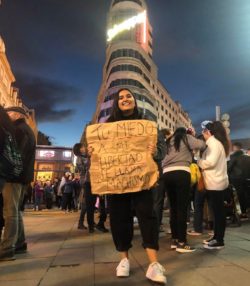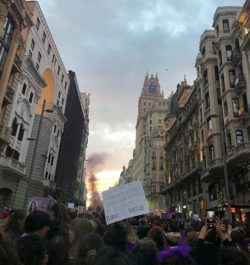‘Somos más fuertes que un Nokia 3310’: International Women’s Day in Madrid

‘Tu miedo a mi libertad se llama machismo’ - Your fear of my liberty is called machismo
by Zahra Iqbal
'Somos más fuertes que un Nokia 3310' - We are stronger than a Nokia 3310
Yesterday, 8th March 2020: Madrid was covered by a sea of purple. Men and women of all ages, races and social classes marching down Madrid’s most renowned street Gran Vía; Madrid’s notable buildings were lit up by purple light as we marched with our painted faces and banners to not only celebrate International Women’s day, but to use it as an opportunity to fight.
The beauty of a feminist protest is that to each woman, feminism has a unique meaning. Whether you are fighting against the gender pay gap, tampon tax, femicides or machismo (something very common in Spain); everyone’s story is different.
I frequently say that moving to Spain is like going back in time a little. Spain has only had a democracy since 1975 and is ideologically roughly about 40 years behind other European countries as a consequence of this. This is not helped by the rise of the far-right party, VOX, that other columnists have written about.
In previous articles, I have remarked on how politically turbulent Spain is; from the crisis in Catalonia to La Ley Mordaza (the Gag Law). Machismo remains to be the biggest problem in Spanish society. Machismo is an ideological propaganda that has remained from the old Franco dictatorship. The main idea is that men are superior to women - it encompasses masculine pride and in Spain is a term used to describe gender-based violence. Before 2003, there was not really a law to protect women in Spain, until PSOE (the socialist party) approved the ground-breaking law, protecting women, offering free legal-aid and a secret, free helpline.
Since 2003 over 1000 women have been killed - no, assassinated by machismo. Over 1000. I strongly believe that if this was the other way around, people would be doing something.
I would like to consider myself a bit of a protest veteran. My family are very politically involved and I frequently attend protests around the UK. However, last night, marching with the Spanish women, I felt like I was attending one for the first time.

Last night the ambience was electric, exciting - but underpinned with a lot of anger and sadness; even writing this article now I have goose bumps. We marched behind a sign that said ‘Justicia para Miriam’ (Justice for Mariam), a 25-year-old woman shot 90 times by her partner in September of 2019 in the Comunidad de Madrid, the Greater Madrid area. A lot of the chants also were based around machismo, like ‘no somos todas, faltan las assesinadas’, which translates to ‘we’re not all, we lack the ones who have been assassinated’. My sign read ‘tu miedo a mi libertad se llama machismo’ (your fear of my liberty is called machismo).

We marched alongside families, children, people from all walks of life. And in that very moment I realised that although the beauty of feminism is that it is unique to each person, it made me realise that I almost have some sort of privilege: at home we fight for equality and freedom, but again, in countries as close as Spain, women are literally being assassinated. Though women are viewed as less than equal in many countries across the world, there is still a huge gap between Spain’s treatment of women and the UK’s treatment of women, and it is a gap that should not exist.
It is clear that the fight for equality and female liberation is not over, in any country. But I am left with one pressing question: when will Spain let go of its old, oppressive, machismo past? How many more women need to be killed, how many more laws overturned and changed, until ideologically, Spain revolutionises?
Study Abroad Columnist: Zahra Kiran Iqbal, 3rd Year BA English and Spanish Undergraduate. Currently studying abroad at Universidad Comillas Pontificia, Madrid. Former News Editor for the Gryphon and Former Web/ Publicity Secretary for Leeds Labour Students.
